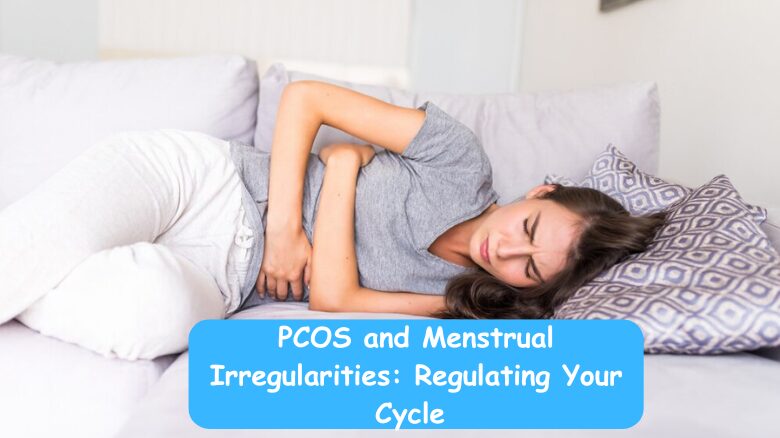Read Now
Getting your Trinity Audio player ready... |
Polycystic Ovary Syndrome (PCOS) is a prevalent hormonal disorder that affects millions of women worldwide. While the symptoms can vary, one of the most common and distressing issues is menstrual irregularities. From missed periods to prolonged and heavy bleeding, these challenges can significantly impact a woman’s physical and emotional health. PCOS and menstrual irregularities are often linked, but with the right care and interventions, managing these issues is entirely possible.
In this blog, we’ll explore how PCOS disrupts menstrual cycles, why it’s essential to address the condition early, and what strategies can help regulate your cycle effectively.
Understanding PCOS and Its Symptoms:
PCOS is a condition that causes a hormonal imbalance, leading to a variety of symptoms, including:
- Irregular or missed periods due to disrupted ovulation.
- Excessive hair growth on the face or body (hirsutism) caused by elevated androgens.
- Acne, oily skin, or hair thinning.
- Unexplained weight gain and difficulty losing weight.
- Difficulty conceiving, which often stems from irregular ovulation.
One of the hallmark symptoms is irregular menstrual cycles. Some women may go months without a period, while others experience prolonged and heavy bleeding. These issues stem from hormonal imbalances that prevent the ovaries from releasing eggs regularly, a process known as anovulation.
How PCOS Affects Your Menstrual Cycle?
A regular menstrual cycle depends on a delicate balance of hormones that signal the ovaries to release an egg each month. In women with PCOS, this balance is disrupted:
- High levels of androgens (male hormones) interfere with the growth and release of eggs.
- Multiple small follicles form in the ovaries but do not mature enough to release an egg.
- Without ovulation, the uterine lining doesn’t shed regularly, leading to irregular periods or prolonged bleeding.
This cycle disruption is why PCOS and menstrual irregularities are so closely intertwined.
The Importance of Early Diagnosis:
Ignoring PCOS symptoms can lead to serious long-term health complications, including:
- Increased risk of Type 2 diabetes and insulin resistance.
- High blood pressure and cardiovascular disease.
- Endometrial hyperplasia, which may progress to uterine cancer if untreated.
Recognizing the signs early and consulting a gynecologist is crucial to preventing these complications and improving your quality of life.
Strategies to Regulate Your Cycle:
Managing PCOS requires a comprehensive approach that includes lifestyle modifications, medical treatments, and alternative therapies. Here are some effective strategies:
1.Adopt a Healthy Lifestyle:
Lifestyle changes can significantly improve hormonal balance and regulate your cycle.
- Weight Management: Losing even 5-10% of your body weight can restore ovulation and improve menstrual regularity.
- Balanced Diet: Focus on a low-glycemic index diet that includes vegetables, lean proteins, whole grains, and healthy fats to stabilize blood sugar levels.
- Exercise Regularly: Physical activity helps improve insulin sensitivity, reduce androgen levels, and promote regular cycles.
2.Medical Treatments:
Medications are often necessary to regulate menstrual cycles and address other PCOS symptoms:
- Hormonal Birth Control: Oral contraceptives are commonly prescribed to regulate periods and reduce androgen levels.
- Metformin: This medication improves insulin sensitivity and can help restore regular ovulation.
- Ovulation-Inducing Drugs: For women trying to conceive, medications like Clomiphene Citrate or Letrozole can stimulate ovulation.
3.Explore Alternative Therapies:
Some women find relief through alternative treatments:
- Acupuncture: This practice may help improve hormonal balance and promote regular cycles.
- Herbal Supplements: Natural remedies like spearmint tea and inositol supplements have shown promise in managing PCOS symptoms.
4.Prioritize Emotional Well-Being:
Living with PCOS can be emotionally taxing. Anxiety about irregular periods, weight gain, and fertility concerns can affect mental health.
- Join PCOS support groups to connect with others facing similar challenges.
- Consider therapy or counseling to manage stress and emotional well-being.
The Role of Medical Guidance:
While lifestyle changes and home remedies can make a difference, consulting a gynecologist is essential for managing PCOS effectively. A personalized treatment plan can address your specific symptoms, regulate your cycle, and improve your overall health.
Managing PCOS and Fertility Concerns:
Many women with PCOS worry about their ability to conceive. While the condition can make it harder to get pregnant, it’s not impossible. With proper medical intervention and lifestyle adjustments, many women successfully conceive. If you’re planning a family, discuss your options with your gynecologist, including fertility treatments and assisted reproductive technologies.
Harsha Hospitals: Expert Care for PCOS and Menstrual Irregularities
Dealing with PCOS and menstrual irregularities can feel overwhelming, but you don’t have to face it alone. Harsha Hospitals is one of the leading healthcare providers specializing in advanced gynecological care. Under the guidance of Dr. M. Neetha, one of the best gynecologists, we offer personalized treatment plans to address PCOS, regulate menstrual cycles, and improve overall well-being. Dr. M. Neetha is a highly experienced and compassionate gynecologist at Harsha Hospitals, specializing in the treatment of PCOS and menstrual disorders. With years of expertise in managing hormonal imbalances, irregular cycles, and fertility issues, Dr. Neetha offers personalized care tailored to each patient's needs. She combines the latest medical advancements with a holistic approach to ensure the best outcomes for her patients.
Whether it's through medication, lifestyle adjustments, or surgical interventions when necessary, Dr. Neetha provides comprehensive treatment options that focus on restoring health, regulating menstrual cycles, and addressing fertility concerns with utmost care and precision. Moreover, our state-of-the-art facilities and compassionate care ensure that every patient receives the best support on their journey to better health. Whether you’re seeking help for irregular periods, fertility concerns, or other gynecological issues, we’re here to assist you.
Take Control of Your Health:
PCOS and menstrual irregularities don’t have to define your life. By adopting a proactive approach that includes lifestyle changes, medical care, and emotional support, you can manage your symptoms and lead a healthier, more fulfilling life.
Visit Harsha Hospitals today to consult with Dr. M. Neetha and take the first step toward regulating your cycle and reclaiming your health. Let us help you on your journey to a brighter, healthier future.



